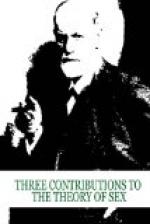existence of this second center (of the underlying
sex) results.” A Dr. Arduin (Die Frauenfrage
und die sexuellen Zwischenstufen, 2d vol. of the Jahrbuch
f. sexuelle Zwischenstufen, 1900) states that “in
every man there exist male and female elements.”
See also the same Jahrbuch, Bd. I, 1899 ("Die
objektive Diagnose der Homosexualitat,” by M.
Hirschfeld, pp. 8-9). In the determination of
sex, as far as heterosexual persons are concerned,
some are disproportionately more strongly developed
than others. G. Herman is firm in his belief
“that in every woman there are male, and in
every man there are female germs and qualities”
(Genesis, das Gesetz der Zeugung, 9 Bd., Libido und
Manie, 1903). As recently as 1906 W. Fliess (Der
Ablauf des Lebens) has claimed ownership of the idea
of bisexuality (in the sense of double sex). Psychoanalytic
investigation very strongly opposes the attempt to
separate homosexuals from other persons as a group
of a special nature. By also studying sexual
excitations other than the manifestly open ones it
discovers that all men are capable of homosexual object
selection and actually accomplish this in the unconscious.
Indeed the attachments of libidinous feelings to persons
of the same sex play no small role as factors in normal
psychic life, and as causative factors of disease they
play a greater role than those belonging to the opposite
sex. According to psychoanalysis, it rather seems
that it is the independence of the object, selection
of the sex of the object, the same free disposal over
male and female objects, as observed in childhood,
in primitive states and in prehistoric times, which
forms the origin from which the normal as well as
the inversion types developed, following restrictions
in this or that direction. In the psychoanalytic
sense the exclusive sexual interest of the man for
the woman is also a problem requiring an explanation,
and is not something that is self-evident and explainable
on the basis of chemical attraction. The determination
as to the definite sexual behavior does not occur
until after puberty and is the result of a series
of as yet not observable factors, some of which are
of a constitutional, while some are of an accidental
nature. Certainly some of these factors can turn
out to be so enormous that by their character they
influence the result. In general, however, the
multiplicity of the determining factors is reflected
by the manifoldness of the outcomes in the manifest
sexual behavior of the person. In the inversion
types it can be ascertained that they are altogether
controlled by an archaic constitution and by primitive
psychic mechanisms. The importance of the narcissistic
object selection and the clinging to the
erotic significance of the anal zone seem to
be their most essential characteristics. But
one gains nothing by separating the most extreme inversion
types from the others on the basis of such constitutional
peculiarities. What is found in the latter as




